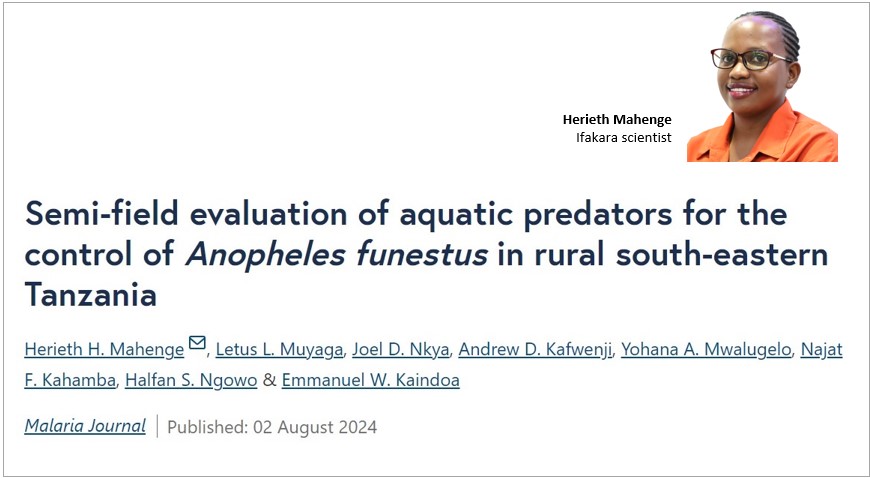
MALARIA: Using natural predators to reduce mosquito populations

Scientists from the Ifakara Health Institute have made significant strides in the fight against malaria by demonstrating how natural predators can help reduce the population of anopheles funestus mosquitoes, the primary carriers of the malaria parasite.
Elaborating in their study, published today on the Malaria Journal, the scientists underscore the potential of using natural predators as a complementary approach to combat malaria. The study was conducted between June and November 2022, in a semi-field system facility of Ifakara Health Institute known as ‘Mosquito City’ located at Kining’ina village in southeastern Tanzania.
Biological control as a promising alternative
“Biological control is a promising alternative or complementary approach for controlling vector populations in response to the spread of insecticide resistance in malaria vectors. This study evaluated the efficacy of three selected potential predators on the density and fitness parameters of Anopheles funestus larvae in rural Tanzania,” the scientists wrote.
Evaluating aquatic predators’ efficacy
The study, the first of its kind, assessed the efficacy of three types of aquatic predators – damselflies (Coenagrionidae), backswimmers (Notonectidae), and dragonflies (Aeshnidae) – on controlling Anopheles funestus mosquitoes.
Impact on mosquito density, fitness traits
The researchers found that all three predator species significantly reduced the density of An. funestus mosquitoes. Damselflies were ranked as the most efficient predators while backswimmers followed closely and dragonflies were the least efficient but still contributed to control efforts.
The study also revealed that these predators not only reduced the emergence of adult mosquitoes but also affected their fitness traits, such as survival rates and wing size. The predators primarily targeted medium-sized larvae (stage 3), significantly reducing the number of mosquitoes that survive to adulthood.
"This study demonstrates a significant predation impact by the evaluated predators, all of which effectively reduced the larval and adult density of An. funestus mosquitoes," the scientists noted. Furthermore, they recommended integrating these natural predators into existing malaria vector control strategies, underlining that this could “ultimately lead to a reduction in malaria transmission.”
Pros, precautions of biological control methods
The scientist also outlined the significant advantages of using biological control methods, noting their ability to target mosquito species at low densities without harming non-target organisms. This approach is relatively easy to implement in field conditions. However, the scientists caution that it is essential to fully understand the ecological impacts of these predators before introducing them widely.
Paving the way for sustainable solutions
Through this study, Ifakara scientists have paved the way for innovative and sustainable solutions to combat malaria. They concluded by recommending further studies to investigate the broader ecological effects and other factors that might influence mosquito population dynamics and malaria transmission over the long term.
“The findings of this study provide valuable insights relevant to understanding the effectiveness of these predators against An. funestus larvae and can be used as a baseline for future studies in the natural aquatic environments in rural Tanzania and other regions with comparable eco-epidemiological conditions,” they concluded.
Study contributors
This study was led by Ifakara Health Institute scientist Herieth Mahenge, as part of her MSc research, with Halfan Ngowo and Emmanuel Kaindoa sharing equal supervisory and contribution roles. Other contributors include Letus Muyaga, Joel Nkya, Andrew Kafwenji, Yohana Mwalugelo, and Najat Kahamba.
Read the publication here.
